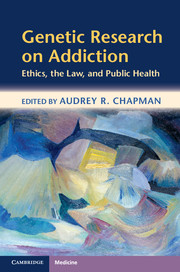Book contents
- Frontmatter
- Contents
- Contributors
- Preface
- Section 1 Introduction
- 1 Introduction to the volume
- 2 The implications of genetic research on alcohol dependence for prevention and treatment
- 3 Promises and risks for participants in studies of genetic risk for alcohol or drug dependence
- Section 2 Research ethics
- Section 3 Translating addiction research
- Section 4 Conclusions
- Index
- References
2 - The implications of genetic research on alcohol dependence for prevention and treatment
from Section 1 - Introduction
Published online by Cambridge University Press: 05 September 2012
- Frontmatter
- Contents
- Contributors
- Preface
- Section 1 Introduction
- 1 Introduction to the volume
- 2 The implications of genetic research on alcohol dependence for prevention and treatment
- 3 Promises and risks for participants in studies of genetic risk for alcohol or drug dependence
- Section 2 Research ethics
- Section 3 Translating addiction research
- Section 4 Conclusions
- Index
- References
Summary
Introduction
Alcohol dependence is a disorder that causes significant harm, not only to the health of affected individuals, but also through the significant social and economic costs borne by society. About 4% of the global burden of disease (measured by disability-adjusted life years; DALY) has been attributed to alcohol consumption and 1.6% to alcohol-use disorders specifically (WHO, 2008). In high-income countries such as the United States, alcohol-use disorders cause 3.4% of total disease burden (WHO, 2008).
Alcohol dependence (AD) may manifest in tolerance, withdrawal symptoms, or the use of alcohol to avoid or relieve withdrawal, drinking more than intended, unsuccessful attempts to cut down use, excessive time related to alcohol consumption (including alcohol seeking), impaired social or work activities, and continued use despite physical or psychological consequences. AD may increase a person’s risk of other forms of substance abuse, psychiatric disorders, and physical illnesses, such as heart disease and cancers, and lead to unemployment, relationship breakdowns, accidents, and imprisonment due to crimes committed as a result of alcohol abuse.
The existence of a genetic component of AD has long been suggested by the observation that the disorder runs in families. The substantial genetic contribution has subsequently been confirmed by twin and adoption studies that estimate the heritability of AD to range from 50 to 60% (Agrawal and Lynskey, 2008 ). Approximately 56% of the variance in AD is caused by genetic factors, whereas 44% is as a result of specific environmental factors not shared by family members, including peer influences and experiences after leaving the home environment (Kendler and Prescott, 2006 ). Shared environmental factors such as social class, parental rearing styles, familial attitudes to drinking, parental drinking practices, and – in the case of twins – intrauterine environment, make little contribution to AD itself (Kendler and Prescott, 2006 ) but explain about 15% of the variance in initiation of alcohol use (Sartor et al., 2009 ).
- Type
- Chapter
- Information
- Genetic Research on AddictionEthics, the Law, and Public Health, pp. 16 - 30Publisher: Cambridge University PressPrint publication year: 2012



